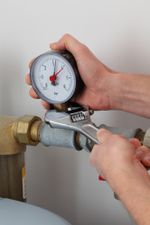
While many homeowners have a water softener in their house, few people understand how they work. These vital appliances serve an important purpose, saving you from replacing faucet heads and water heaters. Consult the guide below to learn more about how your water softener protects your home and improves your water.
What Is Hard Water?
There is nothing inherently wrong with hard water, as it is non-toxic and safe to drink or utilize in the home. However, with a substantial amount of mineral content, it has a distinct taste that many find off-putting. The excess of magnesium and calcium in hard water can clog your pipes and severely damage appliances like dishwashers and washing machines. It also interacts poorly with soaps, making it difficult to properly rinse clothes, hair, and skin.
What Do Water Softeners Do?
 Water softeners lower the mineral density of hard water through a process called ion exchange. The hard water enters the water softener and flows through a bed of plastic resin beads that are charged with a sodium ion. The sodium ion has a negative charge that attracts the positive charge of the minerals in the hard water.
Water softeners lower the mineral density of hard water through a process called ion exchange. The hard water enters the water softener and flows through a bed of plastic resin beads that are charged with a sodium ion. The sodium ion has a negative charge that attracts the positive charge of the minerals in the hard water.
When the hard water passes through, these beads take hold of the calcium and magnesium ions, removing them from the water and replacing them with sodium ions. This allows softened water to flow into your home, making for tastier drinking water, less sudsy cleaning, and no risk of pipe clogging or appliance damage.
Could your home benefit from a water softener? Reach out to the plumbing professionals at Niebuhr Plumbing & Heating. Located in La Crosse, WI, they’ve been providing plumbing services, HVAC repairs, and sewer cleaning to the Coulee Region since 1900. With 24/7 emergency services, their team of experts will assess and resolve your issue as quickly as possible, whenever you may need them. Call (608) 782-1700 or visit their website to learn more about their services.
About the Business
Have a question? Ask the experts!
Send your question

